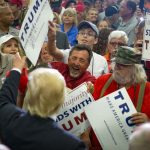 Oxford University’s Carl Benedikt Frey is no stranger to controversy. He burst onto the public stage back in 2013 with a paper highlighting the risks various professions faced of automation in the coming years. He then followed that up with a study exploring the impact of Uber on the taxi industry earlier this year.
Oxford University’s Carl Benedikt Frey is no stranger to controversy. He burst onto the public stage back in 2013 with a paper highlighting the risks various professions faced of automation in the coming years. He then followed that up with a study exploring the impact of Uber on the taxi industry earlier this year.
It is to automation however that Frey returns, with his colleagues Thor Berger and Chinchih Chen analyzing the voting record of Americans in last year’s Presidential election, and cross referencing that with the risk of automation of the professions held by voters.
Automation and voting
The authors wanted to explore whether those whose jobs were at risk would be more likely to vote for radical political parties. The analysis revealed that electoral districts where automation was more prevalent were significantly more likely to vote for Donald Trump than Hillary Clinton.
A 5% increase in jobs lost to automation in the past was associated with a 10% increase in voter share for Donald Trump. The authors believe it’s the first analysis linking automation with political outcomes.
“Our study suggests that automation has been the real cause of voters concern”, Frey says. “The prime victims of the Computer Revolution (the period starting with the arrival of the personal computer in the 1980s, through to the development of the internet in the 1990s) want anything but the status quo. The populist rebellion in America, Europe, and elsewhere, has many causes, but workers’ losing out to technology is seemingly the main reason.”
Suffice to say, given Frey’s earlier work, he believes that this is only the beginning of such phenomenon and that as automation kicks up a gear, people will be increasingly attracted to radical politicians for answers to their situation. Frey likens the 2016 election with the political upheaval caused by the industrial revolution in Britain, where the Luddite rebellion raged against the machines that they believed were destroying their livelihoods.
He predicts that there are many countries where the risk of automation is higher, and therefore the risk of political upheaval is similarly high. Political leaders are therefore forewarned that their own jobs may be about to be disrupted.